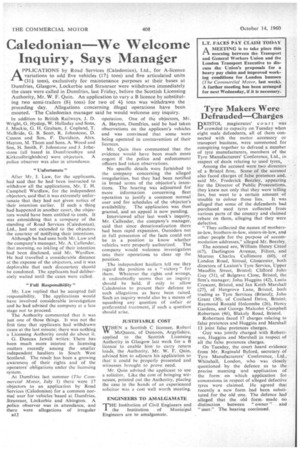Caledonian We Welcome Inquiry, Says Manager
Page 46

If you've noticed an error in this article please click here to report it so we can fix it.
APPLICATIONS by Road Services (Caledonian), Ltd., for A-licence variations to add five vehicles (174 tons) and five articulated units (31f tons), exclusively for maintenance purposes at their bases at Dumfries, Glasgow, Lockerbie and Stranraer were withdrawn immediately
• the cases were called in Dumfries, last Friday, before the Scottish Licensing Authority, Mr. W. F. Quin. An application to vary a B licence by substitut • ing two semi-trailers (84 tons) for two of 41 tons was withdrawn the preceding day. Allegations concerning illegal operations have been mooted. The Caledonian manager said he would welcome any inquiry.
In addition to British Railways, J. D. Wright, G. Hyslop, W. Halladay and Sons, J. Mackie, G. H. Graham, J. Copland, T. McBride, G. B. Scott, R. Johnstone, D. Casson and Son, F. Davidson, Alex. 1-layton, M. Thom and Sons, A. Wood and Son, H. Smith, F. Johnstone and J. Johnstone (all based in Dumfriesshire and Kirkcudbrightshire) were objectors. A police observer was also in attendance.
"Unfortunate" After Mr. 1. 'Law, for the applicants, had said that he had been instructed to withdraw all the applications, Mr. T. H. Campbell Wardlaw, for the independent objectors, said that it was extremely unfortunate that they had not given notice of their intention earlier. If such a thing had happened in another court, the objectors would have been entitled to costs. It was astonishing that a company of the standing of Road Services (Caledonian), Ltd., had not extended to the objectors the courtesy of notifying their intentions.
Although he had seen both Mr. Law and the company's manager, Mr. A. Callender, that morning, no inkling of their intention had been disclosed, said Mr. Wardlaw. He had travelled a considerable distance at the expense of the objectors, and it was deplorable that such discourtesy should be condoned. The applicants had deliberately waited until the cases were called.
"Full Responsibility" Mr. Law replied that he accepted full responsibility. The applications would have involved considerable investigation and he had advised the company at a late stage not to proceed.
The Authority commented that it was just one of those things. It was not the first time that applicants had withdrawn cases at the last minute; there was nothing a Licensing Authority could do about it.
• G. Duncan Jewell writes: There has been much more interest in licensing matters recently among the smaller independent hauliers in South West Scotland. The result has been a growing awareness of their rights and of the operators' obligations under the licensing system.
At Dumfries last summer (The Commercial Motor, July 1) there were 17 objectors to an application by Road Services (Caledonian) for a common normal user for vehicles based at Dumfries, Stranraer, Lockerbie and Abington. A police observer was in attendance, and there were allegations of irregular al2 operation. One of the objectors, Mr. A. Hayton, Dumfries, said he had taken observations on the applicant's vehicles and was convinced that some were being operated in contravention of their licences.
Mr. Quin then commented that the evidence would have been much more cogent if the police and enforcement officers had taken observations.
No specific details were furnished to the company concerning the alleged irregularities, but they had been notified in broad terms of the objector's intentions. The hearing was adjourned for more information concerning fleet operation to justify a common normal user and for Schedules of the objector's availability. The application was then granted, and an appeal is now pending.
Interviewed after last week's inquiry, Mr. Callender, the company's manager, said that since denationalization there had been rapid expansion. Outsiders not in full possession of the facts could not be in a position to know whether vehicles were properly authorized. The company would welcome investigation into their operations to clear up the position.
The independent hauliers tell me they regard the position as a " victory " for them. Whatever the rights and wrongs, it undoubtedly seems that an inquiry should be held, if only to allow Caledonian to present their defence to such allegations as have been raised. Such an inquiry would also be a means of squashing any question of unfair or preferential treatment, if such a question should arise.
JUSTIFIABLE COST HEN a Scottish C licensee, Robert McQueen, of Dunoon, Argyllshire, applied to the Scottish Licensing Authority in Glasgow last week for a B licence' to enable • him to carry return loads, the Authority, Mr. W. F. Quin, advised him to adjourn his application so that it could be properly presented and witnesses brought to prove need.
Mr. Quin advised the applicant to use a solicitor. Like the cost of bringing witnesses, pointed out the Authority, placing the case in the hands of an experienced solicitor was a cost well worth meeting,




































































































































